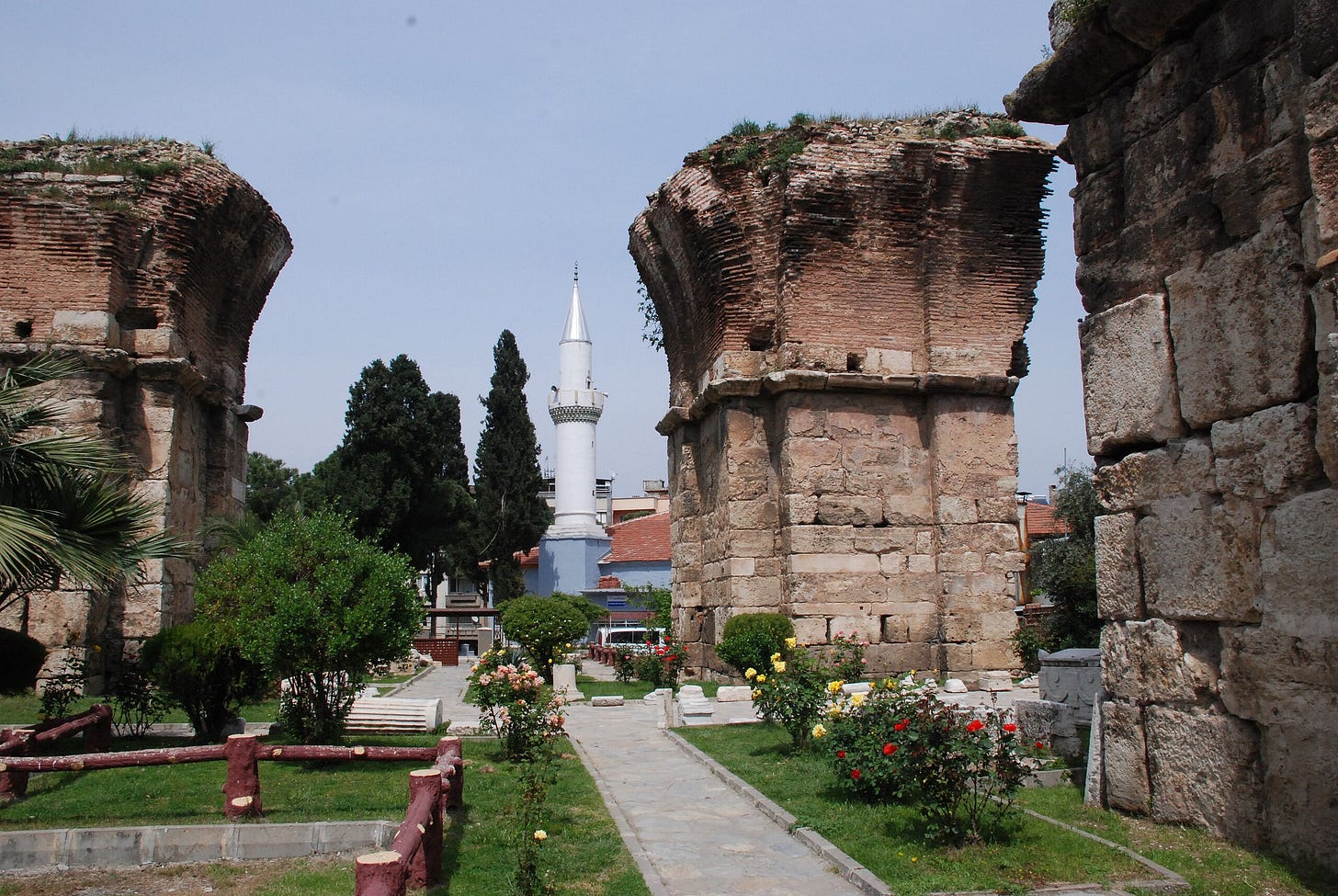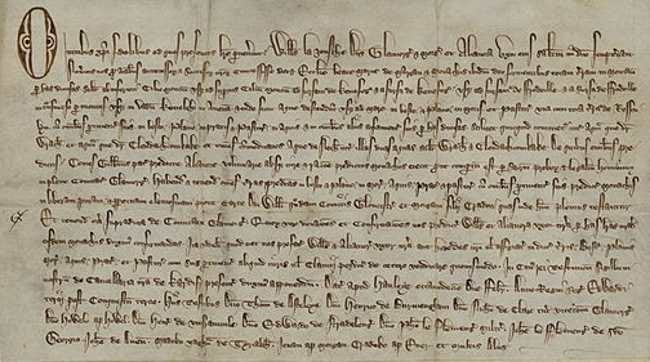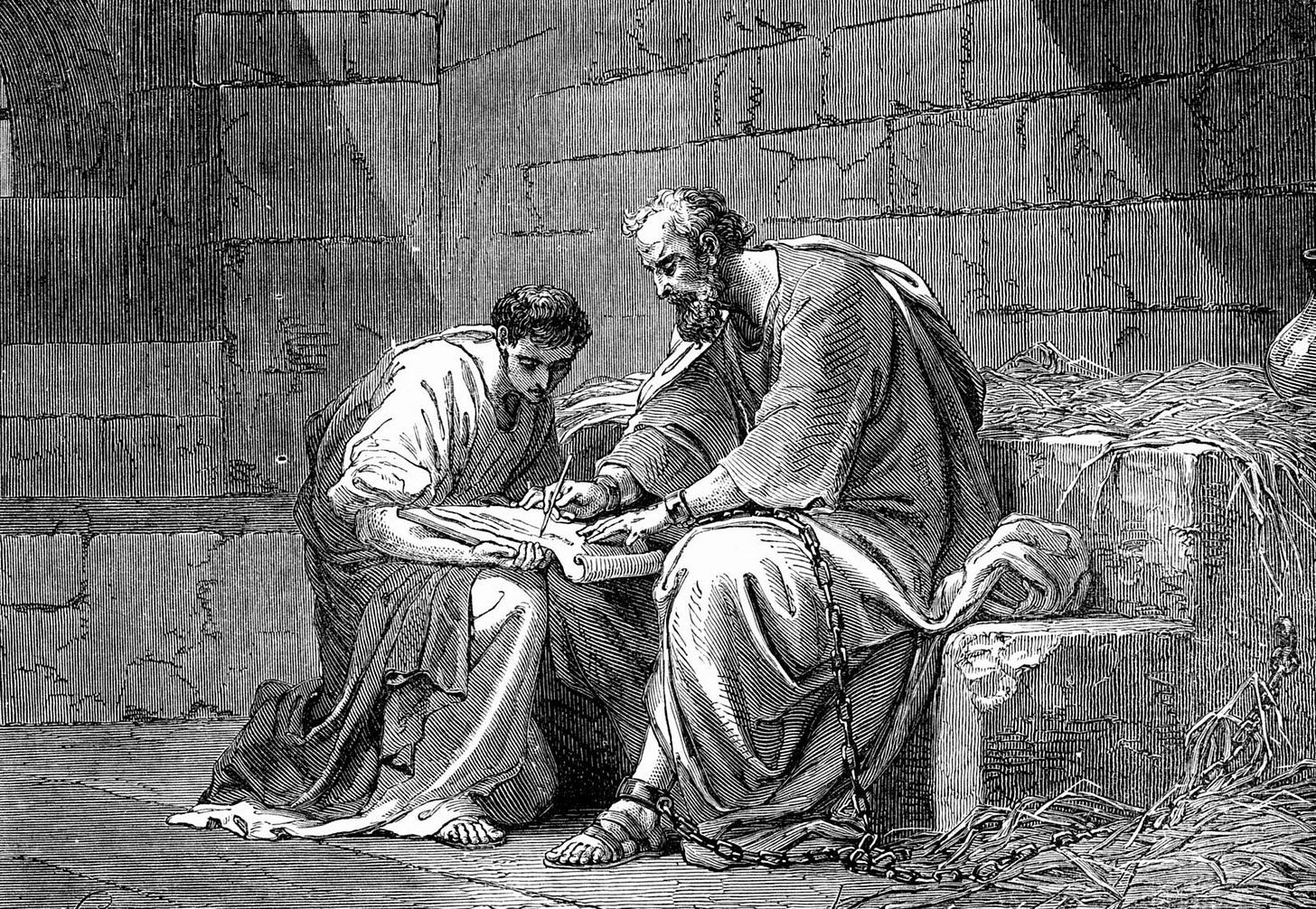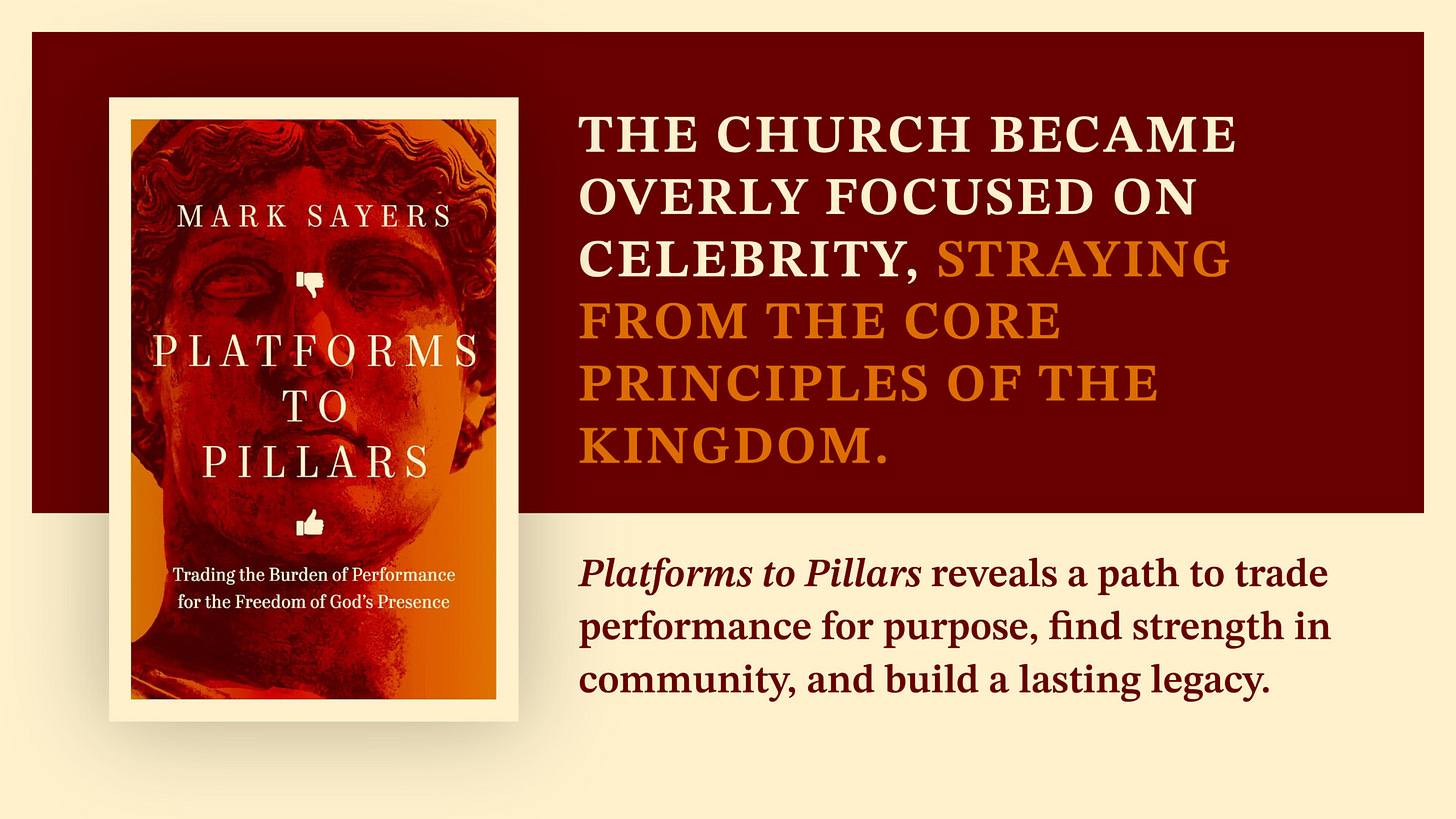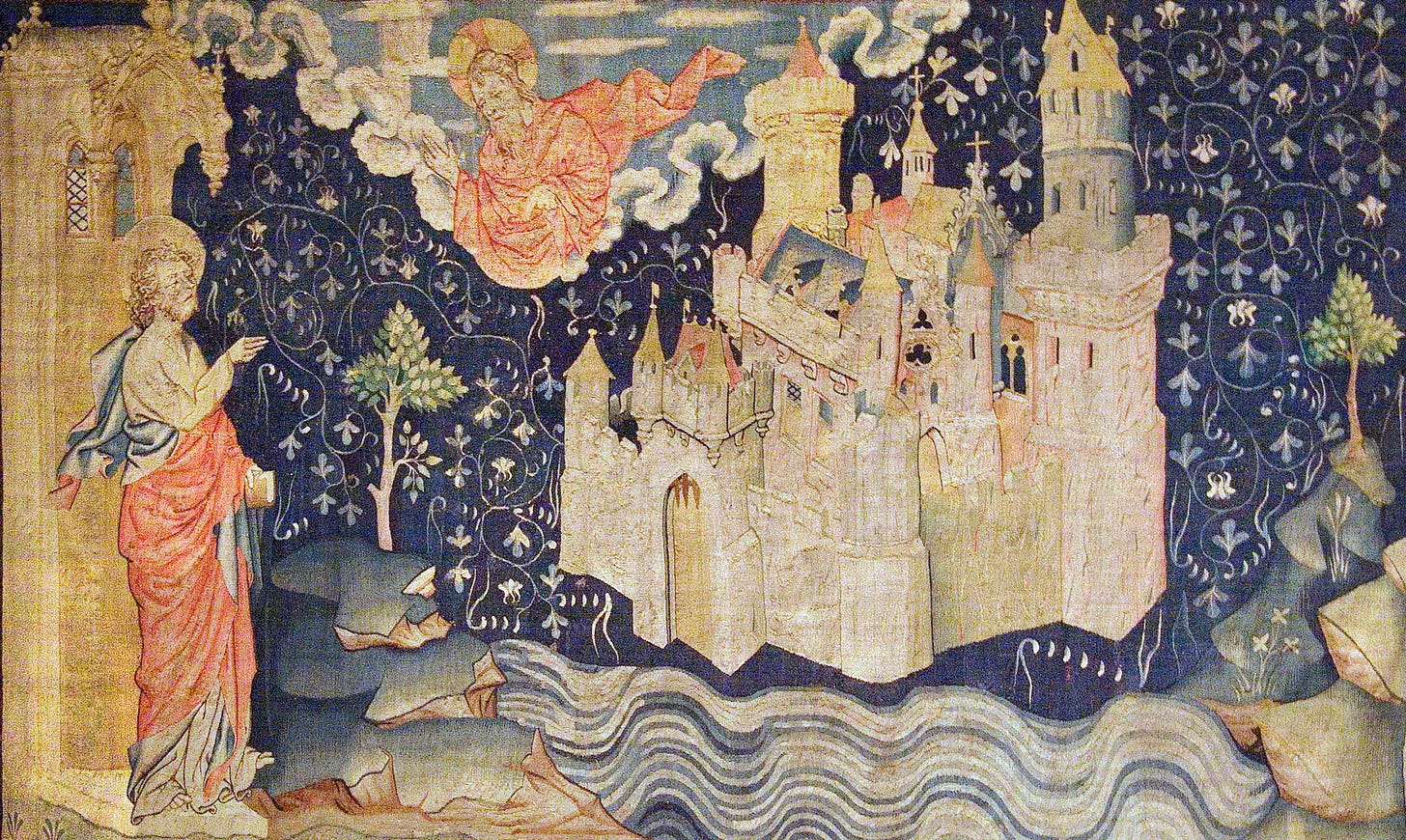Loyalty: The Church of Philadelphia
a sermon reflection on Pastor Jeremy’s Sunday sermon about Revelations 3:7-13
This is the first of two sermon reflections for Sunday November 23rd. This essay reflects on the sixth sermon in my local church’s Book of Revelation sermon series. Pastor Jeremy delivered this week’s sermon.
If you appreciate these sermon reflections or any of my writing, please feel free to drop a tip in the tip jar, aka Buy Me a Coffee! Much appreciated.
image via wikipedia
Revelations 3:7-13 :: The Message to Philadelphia
7 ‘And to the angel of the church in Philadelphia write:
These are the words of the holy one, the true one,
who has the key of David,
who opens and no one will shut,
who shuts and no one opens:
8 ‘I know your works. Look, I have set before you an open door, which no one is able to shut. I know that you have but little power, and yet you have kept my word and have not denied my name. 9 I will make those of the synagogue of Satan who say that they are Jews and are not, but are lying—I will make them come and bow down before your feet, and they will learn that I have loved you. 10 Because you have kept my word of patient endurance, I will keep you from the hour of trial that is coming on the whole world to test the inhabitants of the earth. 11 I am coming soon; hold fast to what you have, so that no one may seize your crown. 12 If you conquer, I will make you a pillar in the temple of my God; you will never go out of it. I will write on you the name of my God, and the name of the city of my God, the new Jerusalem that comes down from my God out of heaven, and my own new name. 13 Let anyone who has an ear listen to what the Spirit is saying to the churches.
image via Tours Around Turkey
The King Eumenes II of Pergamum founded Philadelphia in 189 BC and named it after his brother, Attalus II Philadelphus. In Greek, Philadelphia means brotherly love — Philos means love, and Aldephias means brotherly. So, we can say loyalty served as a founding ethic of Philadelphia.
According to Miriam-Webster dictionary, the adjective loyal means unswerving in allegiance: such as a. faithful in allegiance to one’s lawful sovereign or government; b. faithful to a private person to whom faithfulness is due; c. faithful to a cause, ideal, custom, institution, or product.
Do we have an ethic of loyalty today, in our culture? I think we do not, I think convenience and selfish devotion to an ideology of political morality have come to dominate our behaviour and the choices we make in relationships and consumption choices. To be sure, it’s mostly wise to choose financial practicality over brand loyalty — who doesn’t want their money to spread farther? What about compromising loyalty in relationships? We live in a cancel culture — we cancel others due to our fealty to a political idea. We trade people in for ideas about them, all based on the latest political edict delivered by some secular false prophet. We think we can go out and find a new one. We think we can go out and buy a new one. We walk away when we face dissent and disagreement. Our culture doesn’t practise loyalty well.
Pastor Jeremy gave us some of the reasons people leave church:
Someone took their seat
Too long service
Pastor grew beard
Kids got the wrong snack at Sunday School
The ancient church of Philadelphia would not give up loyalty to Jesus. Despite the challenges and opposition they faced, despite the congregation of evil that viewed Christians as heresy. The Christians of Philadelphia surely felt tempted to blend in, you know, for the sake of ease. Did they feel pressure too heavy, at times? How did they cope? As Christians do we feel as though we swim upstream? Those who have spoken out against the cult of gender radicalism might feel like we are swimming upstream.
This morning (Monday November 24, 2025) I found out that Barry Neufeld faces a day of jail time for his thought crime of criticising gender ideology and the appropriateness for the teaching profession of those who flagrantly and vulgarly espouse it on social media. He’s a retired probation officer who served as school trustee for many years, and the gender radicals have painted a target on his back. He cannot afford the $53K fine so he has been ordered to spend a day in jail. I saw the order myself via BC CSO1 online, filed October 27, 2025. People are protesting outside the Chilliwack Court House as I write this essay. Modern-day martyrs walk amongst us, it would seem.
To continue with the sermon reflection — in his letters, Paul exhibited a humble transparency, in sharing the struggles, limitations, and fears with which he wrestled. Remember, Paul wrote some of his epistles from a Roman prison cell, and the Romans ultimately executed him. We tend to forget the high price early Christians paid to build and hold together the Christian body that we now take for granted.
Therefore, to keep me from being too elated, a thorn was given to me in the flesh, a messenger of Satan to torment me, to keep me from being too elated.8 Three times I appealed to the Lord about this, that it would leave me, 9 but he said to me, ‘My grace is sufficient for you, for power[c] is made perfect in weakness.’ So, I will boast all the more gladly of my weaknesses, so that the power of Christ may dwell in me. 10 Therefore I am content with weaknesses, insults, hardships, persecutions, and calamities for the sake of Christ; for whenever I am weak, then I am strong.
In 2 Corinthians 12:7-10 (above) Pauls conveys a clear message that encourages honesty and humility about our limitations and grief not stoicism. Reader, it’s okay to not be okay. Our culture values stoicism, that’s not a value of the Christian ethic, though. The Christian ethic values self-control, not stoicism. Why don’t we see church as a hospital for sinners, and not a museum for saints? I wonder, do the self-appointed saints who need the church to serve as their museum see that their self-importance prevents the sinners who cry out from accessing the spiritual medicine they need from the church? I see this phenomenon as an enduring fault line in institutional Christianity — gatekeeping and unwelcoming to keep the bad and wrong out, and keep the good and right in; that’s not the Jesus way. In fact, Jesus talks about that in the gospel.
30 The Pharisees and their scribes were complaining to his disciples, saying, ‘Why do you eat and drink with tax-collectors and sinners?’ 31 Jesus answered, ‘Those who are well have no need of a physician, but those who are sick; 32 I have come to call not the righteous but sinners to repentance’ (Luke 5:30-32).
In His letter, Jesus provides the Christians of Philadelphia with three images:
Key of David
Pillar of G-d
New City from Heaven
These are the words of the holy one, the true one, who has the key of David, who opens and no one will shut, who shuts and no one opens, (Revelations 3:7).
KEY. Image a place which contains all the desires of your heart for peace, love, joy. Then imagine a door stands between you and those desires of your heart. The door will not open, it’s locked and you need a key to unlock the door. Sin, in particular our own yetzer hara, acts as the wall between us and place of perfect peace, love, joy. We try to circumvent and compensate. And we find all our efforts fruitless and futile. What if we met the person with the key? Early Christians called themselves followers of The Way.
The reference to the Key of David refers to book of Isaiah, I will place on his shoulder the key of the house of David; he shall open, and no one shall shut; he shall shut, and no one shall open, says Isaiah 22:22. In Genesis, G-d instructed Noah to keep the door open til the very last minute. Until G-d closed the door and shut them in, anyone could have come through that door, because no one is beyond G-d. In the ancient society of Philadelphia, Christians founds themselves canceled at every turn. As I said above, I think many of us could identify with the persecution and hardships which the Christians of the seven Churches faced in their lives from their society.
image via Christians for Israel
PILLAR. In the ancient city of Philadelphia, the ground trembled often, for it lay on a fault line. Anything could collapse at any open. Hence, the ancient construction technique, in which builders would build foundations of structures atop layers of charcoal and fleece, so the structures would float and withstand the pressures of shifting tectonic plates. When we follow His Way, Jesus makes us like those pillars, which remain strong and unstable. No culture shift of opposition can crumble us when Jesus supports us. It takes many pillars to hold up any structure. Readers might feel like they live in a society built upon a fault line. And no, I’m not referring to the Vancouver-will-fall-into-the-ocean fault line. I mean metaphorical fault lines, human ones, borne out of identity culture, such as Canadians feel very deeply right now.
In Ephesians 2:19-20, Paul writes, so then you are no longer strangers and aliens, but you are citizens with the saints and also members of the household of God, 20 built upon the foundation of the apostles and prophets.
In the times of the Jewish temples, the culture tied its worship of G-d to a physical building where g-d’s presence dwelt. Jesus changed that, He built a temple of G-d no longer made of stone — you and I have become the temple. Individual and collective, we have become a place where G-d can dwell. When we pray, persevere, contribute, are generous with our fellow humans— we become a pillar. In his book Platforms to Pillars, Mark Sayers writes that platforms elevate us whilst pillars hold others up. Readers might see that word platform and think of social media and the influencer culture. Platforms become our personal dais or throne, a tool for our own elevation above others, who then must hold us up. We become like gods, then, through social media platforms. don’t we?
image via Wikimedia
CITY. The passage from Revelations speaks of a New Jerusalem that comes down from heaven. Many of us in Vancouver have moved here from another town or city, we feel acutely the loss of place that comes from moving far away from the place of your birth and upbringing. Losing your city of origin is a loss of identity. The Christians of the ancient Philadelphia church felt cut off from their setting, and Jesus reminded them that they belong to Him, as citizens of the New City. In Christ we belong to each other, as citizens of a new city or country.
What image do you need to lock into today? You have your pick, reader. Key, Pillar, City. Whether it involves getting past an obstacle, needing stability, or needing hopeful belonging in Christ, Jesus can serve as the chief cornerstone of the life you build for yourself.
CSO = Court Services Online



